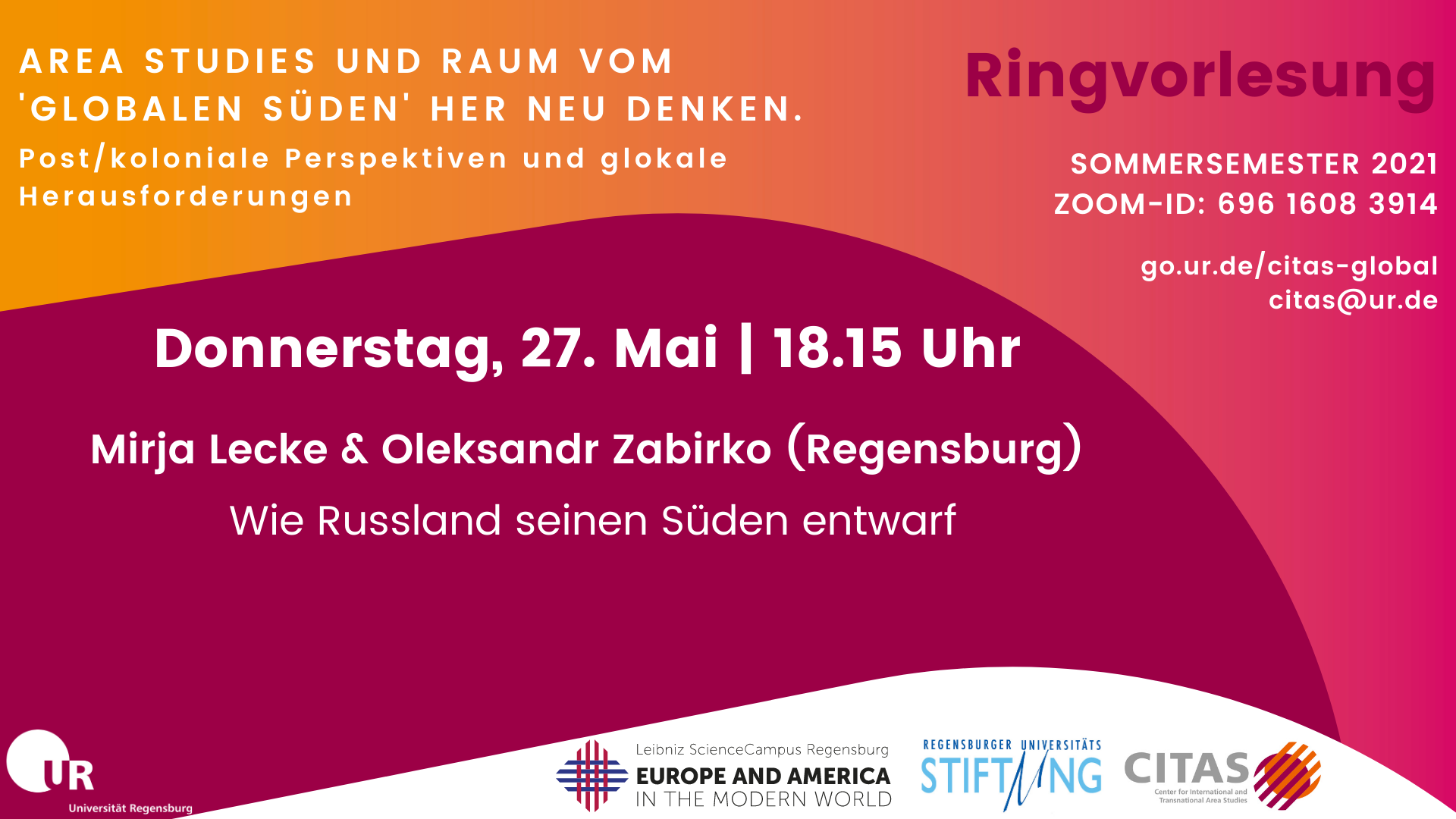Lecture Series: Wie Russland seinen Süden entwarf (Mirja Lecke & Oleksandr Zabirko)
Mirja Lecke & Oleksandr Zabirko (Regensburg) examine how Russia's imperial expansion created diverse North-South relations regarding Ukraine and the Caucasus, while Russia itself was framed in shifting East-West constellations.
Wie Russland seinen Süden entwarf
Russlands Position in der geopolitischen Imagination ist instabil. In der frühen Neuzeit war Russland der Norden, erst im Zuge westeuropäischer Aufklärungsdiskurse wurde es als Osten imaginiert („Inventing Eastern Europe“, Larry Wolff). Seit etwa 1800 aber ist auch für die russischen Eliten selbst ihre Verortung im Osten zu einem Grundbestandteil des Selbstverständnisses geworden. Die Orientierung am Westen, von dem man sich abgrenzt oder den man nachahmt, bestimmt weite Teile russischer Identitätsdiskurse, auch wenn die Werturteile zugunsten des Ostens umgedeutet werden (etwa im Falle der Eurasier-Bewegung). Die Expansion Russlands wurde unterschiedlich begründet: gen Osten stand Zivilisation gegen Natur, während bei der Südexpansion komplexere diskursive Strategien zum Tragen kamen, die wir in unserem Vortrag genauer betrachten möchten. Theoretisch stützen wir uns auf die Schriften von Madina Tlostanova, die Russland als sekundäres, janusköpfiges Imperium beschreibt, das westliche Nord-Süd-Abgrenzungen übernimmt und so eher implizit zu einem zweiten, ‚armen‘, Norden wird. In Fallstudien wollen wir zwei unterschiedliche russische Nord-Süd-Modelle kontrastieren, in deren Rahmen die Ukraine und der Kaukasus (bes. Georgien), als Süden entworfen wurden.
Framing the South in Russian Culture
Russia’s place in the geopolitical imaginary is unstable. In the Early Modern era, Russia was the North. It was only within the context of West European Enlightenment discourses that it came to be imagined as the East (as Larry Wolff argued in Inventing Eastern Europe). From around 1800, however, Russian elites themselves treated their positioning in the East as a fundamental part of their self-conception. Orientation in relation to the West – whether as something to distance from or to imitate – has determined broad elements of Russian identity discourses, even if value judgements favouring the East require reinterpretation (as in the case of the Eurasian movement). Russia’s expansion has been ascribed various justifications: heading eastwards pitted civilization against nature, while the southern expansion brought more complex discursive strategies into play. It is the latter that we seek to explore in this lecture. Our theoretical reflections draw on the works of Madina Tlostanova, who describes Russia as a secondary, Janus-faced Empire that appropriates Western North-South divisions and itself implicitly becomes a second, ‘poor’ North. In our case studies, we contrast two different Russian North-South models within which Ukraine and the Caucasus (particularly Georgia), respectively, are depicted as the South.
Mirja Lecke is Professor of Slavic Literary and Cultural Studies at the University of Regensburg. Oleksandr Zabirko is a Lecturer at the Institute of Slavic Studies at the University of Regensburg.
When? Thursday, 27 May 2021, 18:15 CET
Where? Online via Zoom, https://uni-regensburg.zoom.us/j/69616083914, Meeting ID: 696 1608 3914
The lecture series "Rethinking Area Studies and Space from the 'Global South'? Post/Colonial Perspectives and Glocal Challenges" offers a multiperspectival reconceptualization of area studies and relevant concepts of space in dialog with the 'Global South'. It is organized together with CITAS. Find the full programm here.

